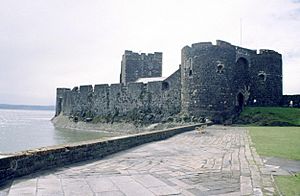Battle of Carrickfergus (1760) facts for kids
Quick facts for kids Battle of Carrickfergus |
|||||||
|---|---|---|---|---|---|---|---|
| Part of the Seven Years' War | |||||||
 North-eastern side of Carrickfergus Castle |
|||||||
|
|||||||
| Belligerents | |||||||
| Commanders and leaders | |||||||
| Strength | |||||||
| 600 | 200 | ||||||
| Casualties and losses | |||||||
| 1 wounded | 200 captured | ||||||
The Battle of Carrickfergus happened in February 1760. It took place in Carrickfergus, Ireland, during the Seven Years' War. This was a big war fought between many powerful countries around the world.
A group of 600 French soldiers landed in Ireland. They were led by a brave French Privateer named François Thurot. A privateer was like a pirate, but they had permission from their government to attack enemy ships. Thurot's forces quickly took over the town. They also captured its castle, which had only a small group of defending soldiers.
When news of the capture reached Dublin, people were worried. The Lord Lieutenant of Ireland, who was like the King's main representative, sent some dragoons. Dragoons were soldiers who rode horses but fought on foot. The Lord Lieutenant, the Duke of Bedford, thought the attack might be a trick. He feared it was a "feint," meaning a fake attack to draw British forces away. He worried that the main French army would then attack Cork or Dublin.
Because of this fear, most of the Royal Irish Army stayed put. They did not march north to help Carrickfergus.
Thurot and his men held Carrickfergus for five days. They threatened nearby Belfast. They also demanded supplies and money from the town. However, many local citizens started to form their own fighting groups, called militia. These groups were led by General Strode. Also, a group of British warships, called a Royal Navy squadron, appeared off the coast.
Seeing these threats, Thurot decided to leave. He loaded his soldiers back onto his ships and sailed away from Carrickfergus.
Thurot was later killed during the Battle of Bishops Court. But his daring act of landing on enemy land made him famous in France. He became a national hero. This was partly because his bravery was very different from how badly French naval officers had performed in the recent Battle of Quiberon Bay. That battle was a major defeat for the French navy.
See also
 | Precious Adams |
 | Lauren Anderson |
 | Janet Collins |

